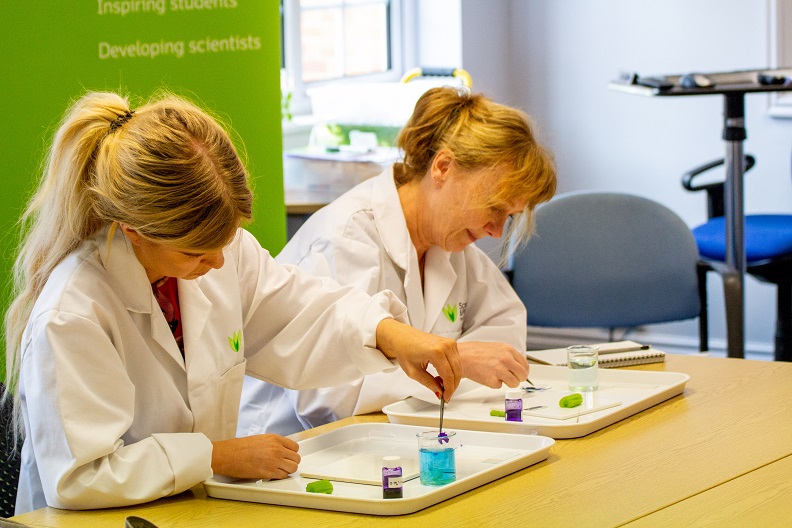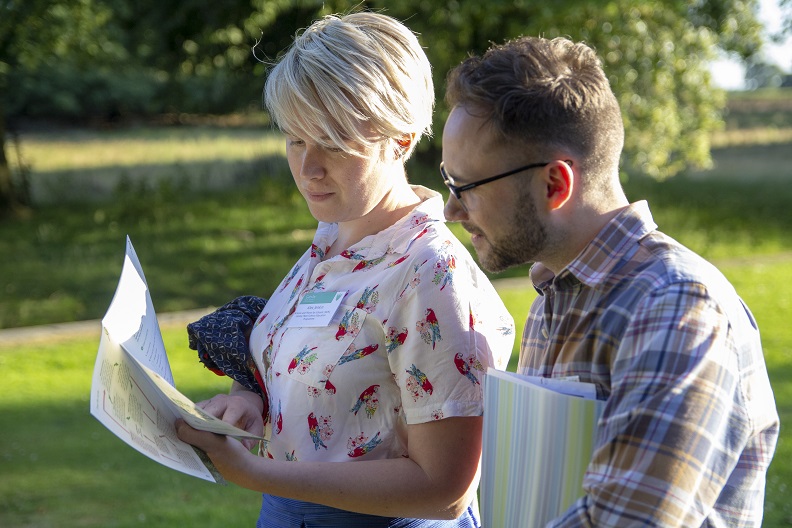
SAPS Plant Science Summer School
For post-16 Biology Teachers – 29th June to 2nd July 2025, York
Ongoing online community of practice throughout 2025-6
Bursaries available for state funded schools
Are you looking to enhance your teaching of plant science? Do you want to increase your plant science subject knowledge and the range of plant examples you use across biology, building synoptic thinking in your students? Would you like to integrate information about exciting careers in plant science into your teaching, showing how plant scientists are meeting global challenges? Are you looking to collaborate on all of these things with a community of like-minded teachers from across the UK? If so, the SAPS Plant Science Summer School is for you!
This course, initially developed in partnership with the National STEM Learning Centre, gives a select group of post-16 biology teachers the opportunity to join a plant science summer school hosted by some of the leading lights in plant science and bring contemporary plant science to classrooms across the UK.
The programme aligns with the Gatsby Plant Science Summer School for biology undergraduates. Participants will take part in practical workshops, attend lectures on plant science research and discuss the importance and relevance of plant science with researchers. In addition, working alongside 1st year bioscience undergraduate students from universities across the UK will give insights into studying biology at university to take back to your students.
The Summer School also provides time and space in a collaborative environment to reflect on your biology teaching. We will support you to develop and produce short teaching resources, inspired by the sessions, to be hosted on the SAPS website and promoted at events throughout the following year. You will leave with a personalised action plan to help support you in taking your learnings forward into your planning, teaching and leadership in your school.
Over the academic year following the Summer School we will meet online as a group (roughly once every half term) to continue to support you in your work as plant-positive teachers. We hope that these sessions will provide continued inspiration and motivation within a community of like-minded professionals. They will also give you the opportunity to influence the work of SAPS as we move forward with new projects, particularly as we look to support potential curriculum changes.
Course outcomes
This course immerses participants in the world of contemporary plant science and supports the Gatsby Benchmarks of Good Career Guidance and the STEM Learning Science Leadership Benchmarks.
You will:
- be able to demonstrate new knowledge and understanding of plant science topics, scientific practice and techniques gained directly from plant scientists
- be able to identify stimulating contemporary plant science ideas, practical activities and resources and use these to develop inspiring teaching approaches
- be able to support, advise and encourage your students about studying biology at university and a career as a scientist, embedding this information into your teaching
- boost your knowledge of biology careers, employers, work placements and opportunities, collecting examples to bring back to your students
- be equipped to discuss how plant science is integral to solving many of our global challenges
- be immersed in an inclusive research environment with representation from diversity-supporting networks and organisations such as Black in Plant Science
- be inspired to integrate plants throughout your biology teaching, encouraging and supporting synoptic thinking in your students
- belong to an ongoing plant science community of practice, supporting each other and your colleagues as plant-positive teachers
Lectures
- Vaccinating plants to boost immunity by Prof Steven Spoel – University of Edinburgh
- Understanding how plants pattern their petal by Dr Edwige Moyroud – Sainsbury Laboratory Cambridge University
- The Resistance of Giant Tropical Trees to Drought by Dr Lucy Rowland – University of Exeter
- Finding drugs in the garden: harnessing plant metabolic diversity for therapeutic applications by Prof Anne Osbourn – John Innes Centre, Norwich
- Researcher Flash Talks
Lectures from the 2024 Plant Science Summer School can be viewed on YouTube.
Practical workshops
- Plant Pathology – Track pathogen infections with FERA scientists using PCR and identify common plant pathogens
- Cell Biology – Use confocal microscopes to experience real-time cell processes visualised with fluorescent proteins
- Plant Development – Unravel the secrets behind the spiral and body form patterns, programme your own flower plan and re-create plant forms in-silico
- Plant ID – Experience a foolproof way to identify and plant to family level and practice your field ID skills
Bursaries of £700 are available for non-fee paying (state) schools. To receive an application form or to find out more, please email us at saps@botanic.cam.ac.uk
You can read more about the Gatsby Plant Science Summer School for undergraduates here: www.gatsbysummerschool.org.uk (Please note that the end date for undergraduates differs from the course end date for teachers.)








"A really excellent course. Great to have a balance of academic enrichment for us and techniques we can use in the classroom."
"I have really enjoyed the opportunity to network and bounce ideas... It’s been amazing! I am so glad that I was able to attend."
"The discussions with the lecturers were really valuable. I liked the focus on experimental data and interpretation of results."
"The opportunities to practise the techniques is fundamentally more important than the results. It was great to hear the troubleshooting and watch a demonstration to provide an opportunity to consider my own practice."
"Attending the SAPS summer school really helped improve my confidence and enthusiasm in teaching plant biology at GCSE and A level. As a result of attending I use many of the SAPS teaching resources, enhancing students learning."
Receive the latest resources and updates
Get half-termly email newsletters with new resources, CPD opportunities, plant science news and inspiration.
Sign up now